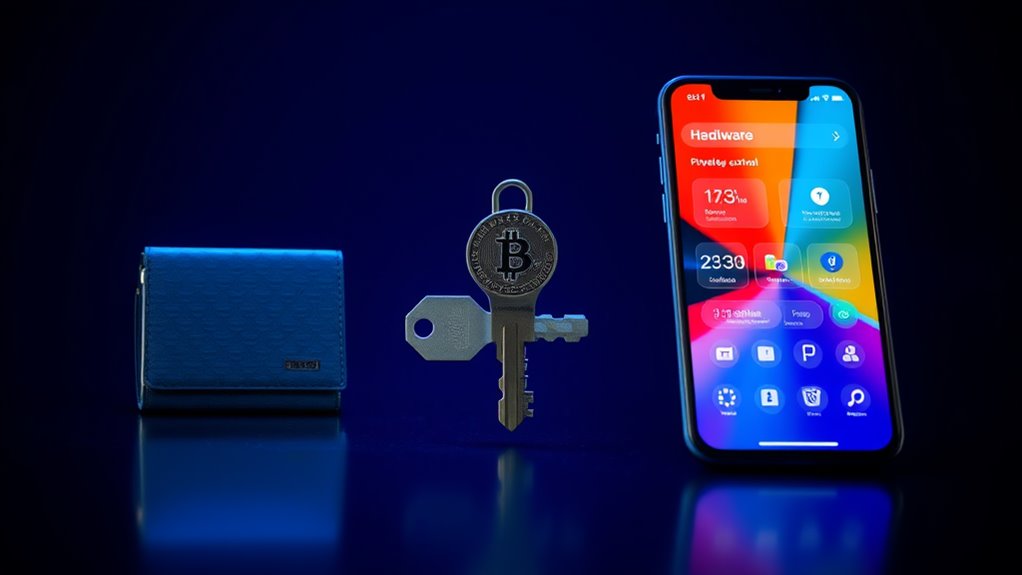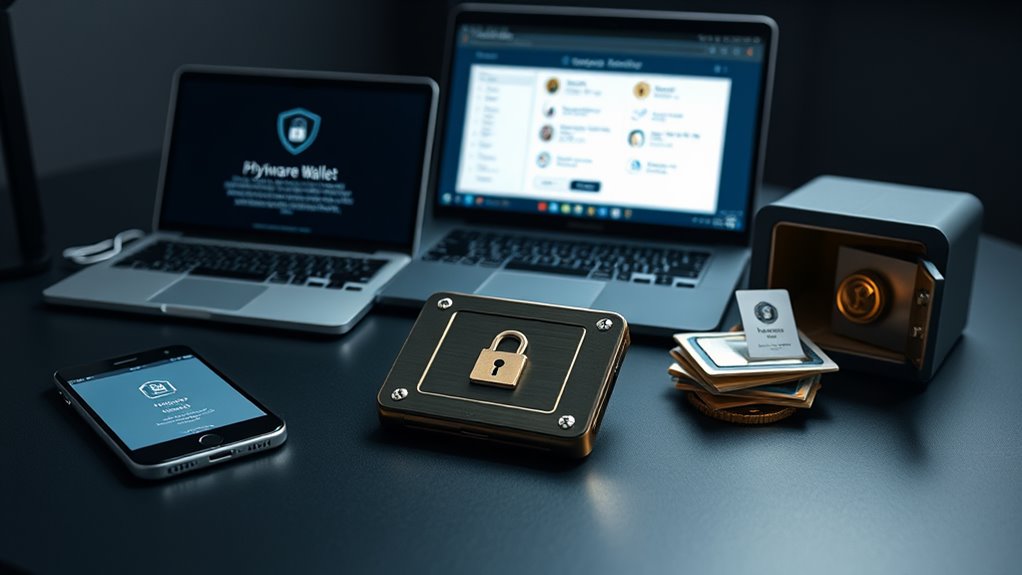Choosing a Crypto Wallet: Key Factors
Note: This post may contain affiliate links, and we may earn a commission (with No additional cost for you) if you purchase via our link. See our disclosure for more info. The gold and crypto world is constantly changing. This is not financial, investment, legal, or professional advice. So, please verify the information on the gold and cryptocurrency provider’s websites.
Choosing a crypto wallet? It's not just about picking a cute logo. Security features? Non-negotiable. Wallets come in hot and cold varieties—hot is convenient, but it's like leaving your front door open. Cold wallets? They're sturdy fortresses. Then there's the private key drama—lose it, and say goodbye to your funds. Compatibility matters too; who wants a wallet that only supports Bitcoin? The right choice could save your assets. There's more to this wallet game, so stick around.

When it comes to choosing a crypto wallet, the stakes are high, and the choices can be overwhelming. You've got custodial and non-custodial wallets. One gives you control, the other hands it over to a third party—like trusting a stranger with your lunch money. Not ideal, right?
Then there's the hot vs. cold storage debate. Hot wallets are convenient, sure, but they're like leaving your front door wide open. Cold wallets? They're your fortress, locked up tight. Cold wallets are optimal for long-term storage and security, making them a preferred choice for those who prioritize asset protection. Additionally, ensure that the wallet you choose offers support for a variety of compatible cryptocurrencies to maximize your investment options.
Security features matter. Two-factor authentication (2FA) is a must. If your wallet doesn't have it, you might as well tape a “please hack me” sign on it. Biometric authentication adds an extra layer of protection by using unique physical characteristics to verify your identity before accessing your assets.
Security features are non-negotiable; without two-factor authentication, your wallet is practically begging for trouble.
And let's talk about private key control. Non-custodial wallets allow you to keep your keys, meaning you're the boss. Custodial wallets? Not so much. You're fundamentally giving a stranger the keys to your kingdom.
Encryption standards vary, too. A wallet's got to be locked down tight, but some are more secure than others. Seed phrase management is another huge deal. Misplace that, and good luck recovering your funds. So, keep it safe—like, in a vault, not under your mattress.
Compatibility is key. Desktop wallets work on various operating systems, while mobile wallets are available for iOS and Android. But if you're into a plethora of coins, choose wisely. Some wallets support hundreds, while others are just Bitcoin-centric. Multi-chain functionality? That's a bonus, letting you transact across different blockchains.
Hardware wallets like Trezor or Ledger offer air-gapped security, which sounds fancy but is fundamentally a fortress against online threats. Software wallets like Exodus keep things user-friendly, but remember: ease of use doesn't always mean safety.
Ultimately, making the right choice in a crypto wallet is about balancing security, control, and convenience. Choose wisely, or risk losing it all.
Frequently Asked Questions
What Types of Cryptocurrencies Can I Store in My Wallet?
The types of cryptocurrencies one can store in a wallet depend on its compatibility. Some wallets are like exclusive clubs, only letting in Bitcoin or Ethereum.
Others? They're all-inclusive, welcoming a variety of coins. Hardware wallets usually support more, thanks to their fancy offline security.
Mobile wallets? They can be picky. And paper wallets? Don't even think about juggling multiple currencies there.
Always check before you plunge into it; not all wallets are created equal.
How Do I Recover My Wallet if I Lose Access?
Losing access to a crypto wallet? That's a nightmare. But fear not, there's a way back.
First, dig up that seed phrase—yes, the one you probably stuffed in a drawer. Type those words in the right order, and voilà!
If you're using a hardware wallet, it's even easier. Just follow the prompts.
But seriously, if you didn't back it up, well, good luck. That's on you. Don't say we didn't warn you!
Are Hardware Wallets Completely Immune to Hacking?
Hardware wallets aren't magic shields against hackers. Sure, they're safer than keeping crypto on an exchange, but they're not completely immune.
Think of them as a strongbox with a key. If that key gets intercepted or you're using a compromised device, good luck!
They have vulnerabilities, like unvalidated outputs and passphrase interception.
Bottom line? Trust them, but don't let your guard down. Stay aware, or you might just find your funds disappearing.
Can I Use Multiple Wallets for Different Cryptocurrencies?
Absolutely, one can use multiple wallets for different cryptocurrencies.
It's not just a good idea; it's practically mandatory in this digital jungle. You wouldn't keep your cash and your groceries in the same bag, right?
Different wallets can mean different coins. Bitcoin here, Ethereum there. It allows better organization and helps manage risks.
Just remember, juggling multiple wallets can get confusing, like trying to remember where you stashed that last slice of pizza.
How Often Should I Update My Wallet Software?
Updating wallet software? Do it regularly. Seriously. Major releases roll out every six to seven months, and minor ones pop up to squash bugs.
Skipping updates is like leaving your front door wide open; vulnerabilities can creep in. Firmware updates help fend off attacks, even for hardware wallets.
If you're not updating, good luck against hackers. Remember, staying current isn't just smart; it's essential. Otherwise, you might as well hand over your keys.












2 Comments